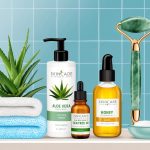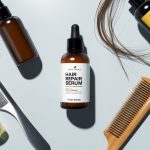Top 10 Beauty Hacks for Glowing Skin Using Everyday Products
Soothing Ingredients for Irritated Skin
Virgin coconut oil is well known for its anti-inflammatory and antioxidant effects. When massaged gently onto dry or inflamed areas, it helps keep the skin’s barrier strong and accelerates healing from minor irritations or flares, as noted in this summary on calming skin with coconut oil.
Colder skincare products, such as chilled face masks or refrigerated creams, may also help ease discomfort and puffiness. Applying products straight from the fridge can minimize inflammation and offer quick relief to sensitive skin after exposure to heat, sun, or allergens.
More tips for using cold therapy at home are available in these DIY skincare beauty hacks. Oatmeal baths and masks provide additional support.
Colloidal oatmeal binds to the skin, providing moisture and forming a protective layer. This ingredient calms itch and irritation, making it a gentle option for those with eczema or generally inflamed skin conditions.
For those dealing with chronic irritation, it is important to avoid heavily fragranced products or harsh exfoliants that may worsen redness or disrupt healing. Instead, simple, natural remedies help restore comfort and promote skin recovery.
Nutrition Hacks for Healthy Glowing Skin
The nutrients found in everyday foods play a direct role in maintaining a clear, radiant complexion. Eating the right combination of vitamins, minerals, proteins, and plant-based foods can support healthy skin, prevent dullness, and improve elasticity.
Skin-Boosting Vitamins and Minerals
Vitamins and minerals are crucial for supporting skin structure and function. Vitamin C helps with collagen production and protects against oxidative stress.
Leafy greens, berries, and citrus fruits are all packed with vitamin C and antioxidants. Vitamin E, found in nuts and seeds, helps combat skin damage and supports moisture retention.
Zinc plays a key role in repairing skin and controlling oil production, making it helpful for those prone to breakouts. Selenium, present in eggs and whole grains, provides additional protection against environmental stressors.
Adding foods rich in vitamin A and beta-carotene, such as carrots and sweet potatoes, can enhance the skin’s natural glow and support cell turnover.
Incorporating Fruits, Vegetables, and Whole Grains
A diet high in a variety of fruits, vegetables, and whole grains supplies essential phytonutrients and antioxidants that fight free radicals. Dark leafy greens, berries, tomatoes, and carrots deliver vitamins A and C, plus dietary fiber that promotes a healthy gut, which is linked to clearer skin.
Whole grains like oats, brown rice, and quinoa provide zinc, selenium, and B vitamins that support cell renewal and tissue repair. High-fiber foods can also help balance blood sugar levels, which reduces the risk of skin inflammation.
For more on the connection between diet and skin, see these nutrition tips for fabulous skin.
Lean Protein for Collagen and Elastin Production
Lean protein sources are essential for maintaining and repairing skin structure. Collagen and elastin, two key proteins found in skin, require amino acids for synthesis.
Chicken, turkey, fish, tofu, and legumes all provide quality protein that the body uses to maintain skin firmness and elasticity. Eggs and low-fat dairy deliver additional amino acids, along with minerals like selenium and zinc.
These nutrients help to minimize sagging, support wound healing, and keep skin resilient. For a well-rounded approach, balance animal sources with plant-based proteins to maximize nutritional benefits and promote long-term skin health.
Lifestyle Tweaks for Radiance
Small daily habits influence how skin looks and feels. Incorporating movement, mindful choices, and stress management can support healthier, more radiant skin at any age.
Exercise and Circulation
Physical activity enhances overall skin health by boosting blood circulation and oxygen delivery to skin cells. When someone exercises regularly, their skin benefits from a more efficient removal of toxins and increased nutrient supply.
Regular movement such as brisk walking, cycling, swimming, or yoga can also stimulate lymphatic drainage, helping to reduce puffiness and support a clearer complexion. Exercise may also lower inflammation, decreasing the frequency of breakouts in some individuals.
To maximize the benefits, it’s important to wash the face after workouts to remove sweat and prevent clogged pores. Hydration during and after physical activity supports both skin elasticity and recovery, helping skin retain its moisture and radiance.
Avoiding Alcohol for Clearer Skin
Limiting or avoiding alcohol can have a noticeable effect on skin clarity and texture. Alcohol acts as a diuretic, leading to dehydration, which often results in skin that looks dull, dry, and tired.
It can also trigger inflammation, cause redness, and worsen conditions like acne and rosacea. Frequent drinking may disrupt sleep, which in turn affects the body’s repair processes, including those essential for healthy skin.
Alcohol also dilates blood vessels, sometimes leading to persistent redness, particularly in the face. Choosing water, herbal teas, or antioxidant-rich beverages instead may support a more even and hydrated skin tone.
For individuals seeking a radiant complexion, replacing alcoholic drinks with hydrating options is a practical way to see quick improvements in skin health as well as overall well-being.
Stress and Cortisol Management
Chronic stress drives the release of cortisol, a hormone that, when persistently elevated, can undermine skin health. High cortisol levels are linked to increased oil production, which can clog pores and cause breakouts.
Stress also impairs skin’s barrier function, making it more prone to irritation, dryness, and premature signs of aging. Managing stress with daily mindfulness practices—such as meditation, deep breathing, or journaling—can lower cortisol and benefit the skin.
Regular sleep habits and social support also buffer the negative effects of stress on skin. By prioritizing stress reduction, people may notice improvements not only in their overall wellness but in the appearance and resilience of their skin as well.



